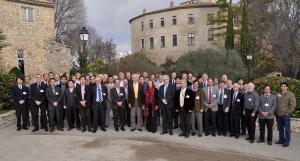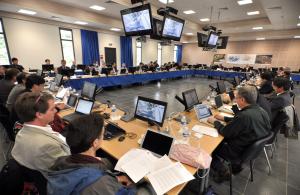ITPA addresses key physics R&D priorities
16 Dec 2011
-
David Campbell, Head of the Directorate for Plasma Operation
The ITPA, which convened in Cadarache during 12-14 December, directly involves 305 fusion experts from 65 institutes, together with a much larger group of collaborators who contribute to the ITPA's wide-ranging research on fusion physics.
The latest major review of tokamak physics R&D in support of ITER was hosted by the ITER Organization during 12-14 December. The joint meeting of the International Tokamak Physics Activity (ITPA) Coordinating Committee and representatives of the International Energy Agency's (IEA) Implementing Agreement for Cooperation on Tokamak Programs also marked the tenth anniversary of ITPA's establishment .
In his opening remarks, the ITPA Coordinating Committee chair, Dr Yutaka Kamada of JAEA, noted that the ITPA directly involves 305 fusion experts from 65 institutes, together with a much larger group of collaborators who contribute to the ITPA's wide-ranging research on fusion physics.
The ITPA has built up a strong collaboration with the IEA's Implementing Agreements (IAs) on tokamak fusion research. The first joint meeting of the ITPA and the IEA IAs took place at MIT in November 2002 with the aim of developing a program of joint experiments on burning plasma physics which would strengthen collaboration among the world's major tokamak fusion facilities.Since that initial meeting, proposals for research which leverage the benefits of executing essentially the same experiment on two, three or more of the major tokamaks of the ITPA partners have been reviewed and approved through a joint ITPA/IEA-IA review meeting which takes place annually.
Following the integration of several of the IEA Implementing Agreements into a single Implementing Agreement on Cooperation on Tokamak Programs (CTP) it was agreed that joining the ITPA CC and the ITPA/ CTP meetings into a single annual review of the ITPA Topical Groups' research activities and their proposals for joint experiments addressing ITER's physics R&D priorities would provide an effective forum for evaluating and planning the work of the ITER partners' leading tokamak facilities in support of ITER.
Director-General Motojima highlighted project progress and stressed the priority of keeping to "scope, schedule and cost" during the meeting.
The overall focus of this week's meeting was the review of the progress made by ITPA Topical Groups in addressing ITER key physics R&D priorities, including areas such as H-mode plasmas, ELM control, disruption mitigation, plasma operation with metallic plasma-facing components, development of ITER plasma scenarios, energetic particle physics and plasma measurement systems.
Impressive results were presented by the Topical Group Chairs underlining the quality of the experimental, modelling and theoretical research undertaken within the ITPA framework. Many aspects of these presentations reflected the benefits of the program of joint experiments conducted by the tokamak facilities in collaboration with the Topical Groups. Further proposals for joint experiments were reviewed in a dedicated session of the meeting.
The meeting had a further significance in that it marked a major change in the leadership of the Topical Groups (TG). TG Chairs who have led research activities over the past three-and-a-half years, and whose service to the ITPA typically spans the entire 10 years of its existence, were warmly thanked by Dr. Kamada for their leadership and contributions.
A new group of Chairs, many of whom have served as TG Deputy Chairs in recent years, will now assume office and take responsibility for coordinating the R&D activities of each TG over the next three years.



